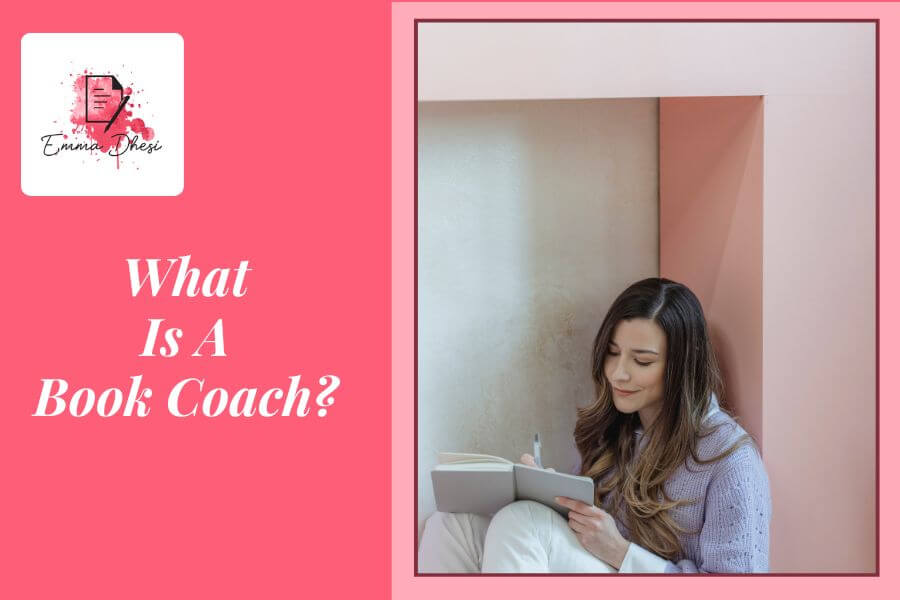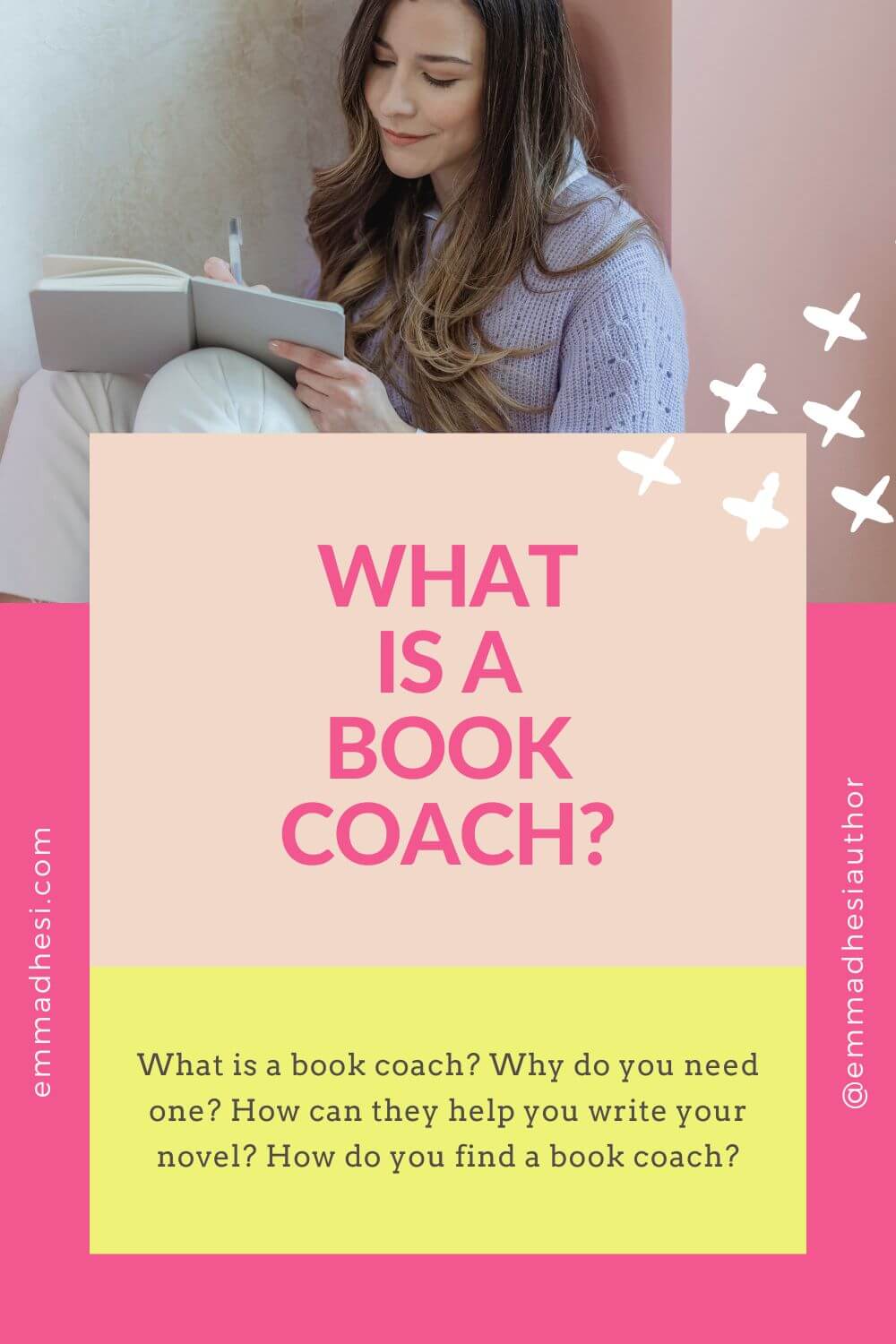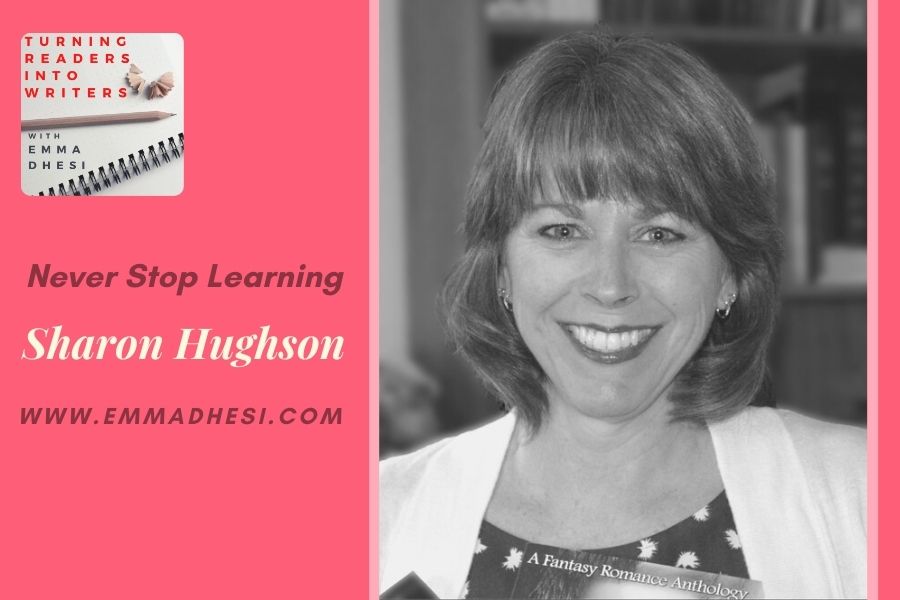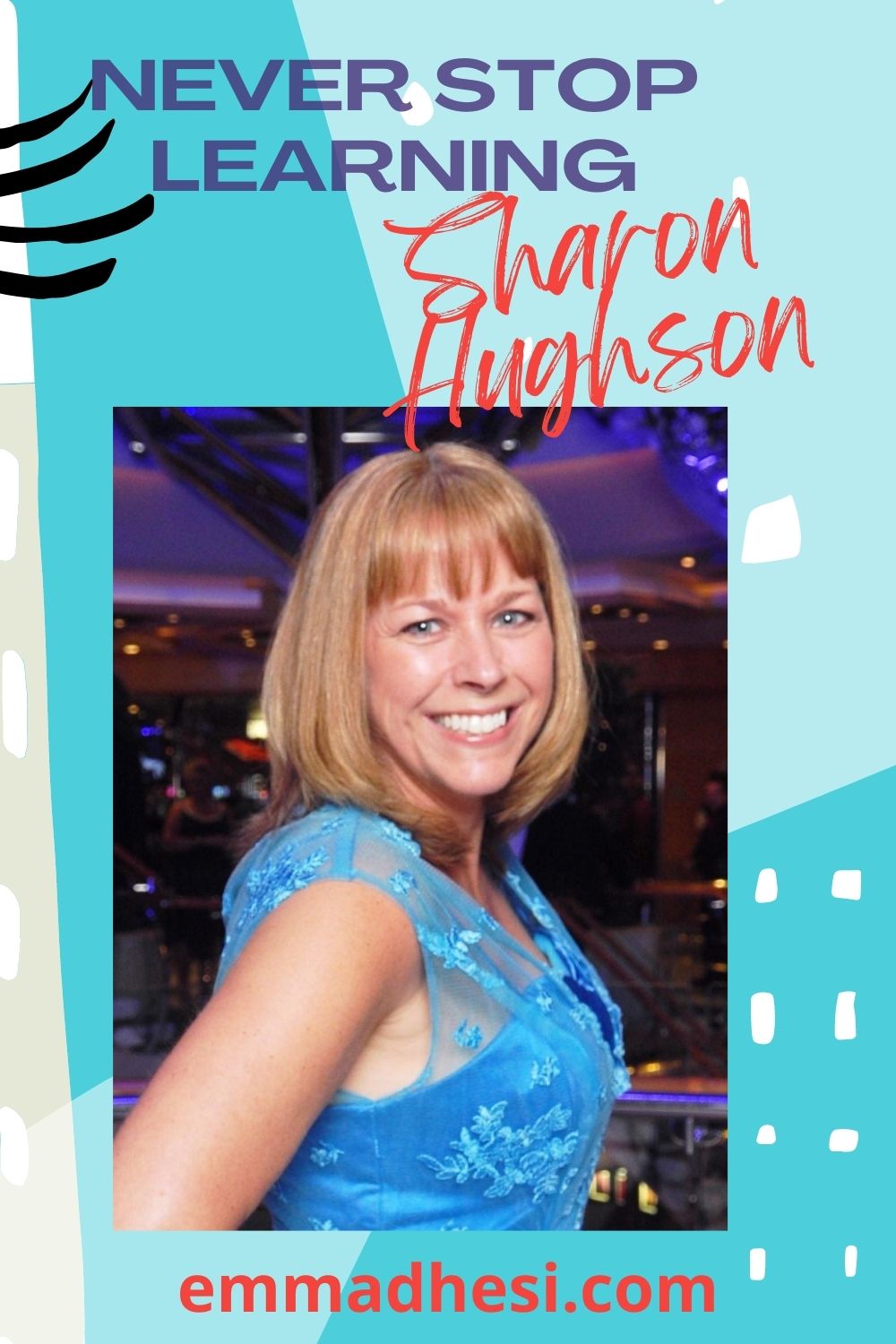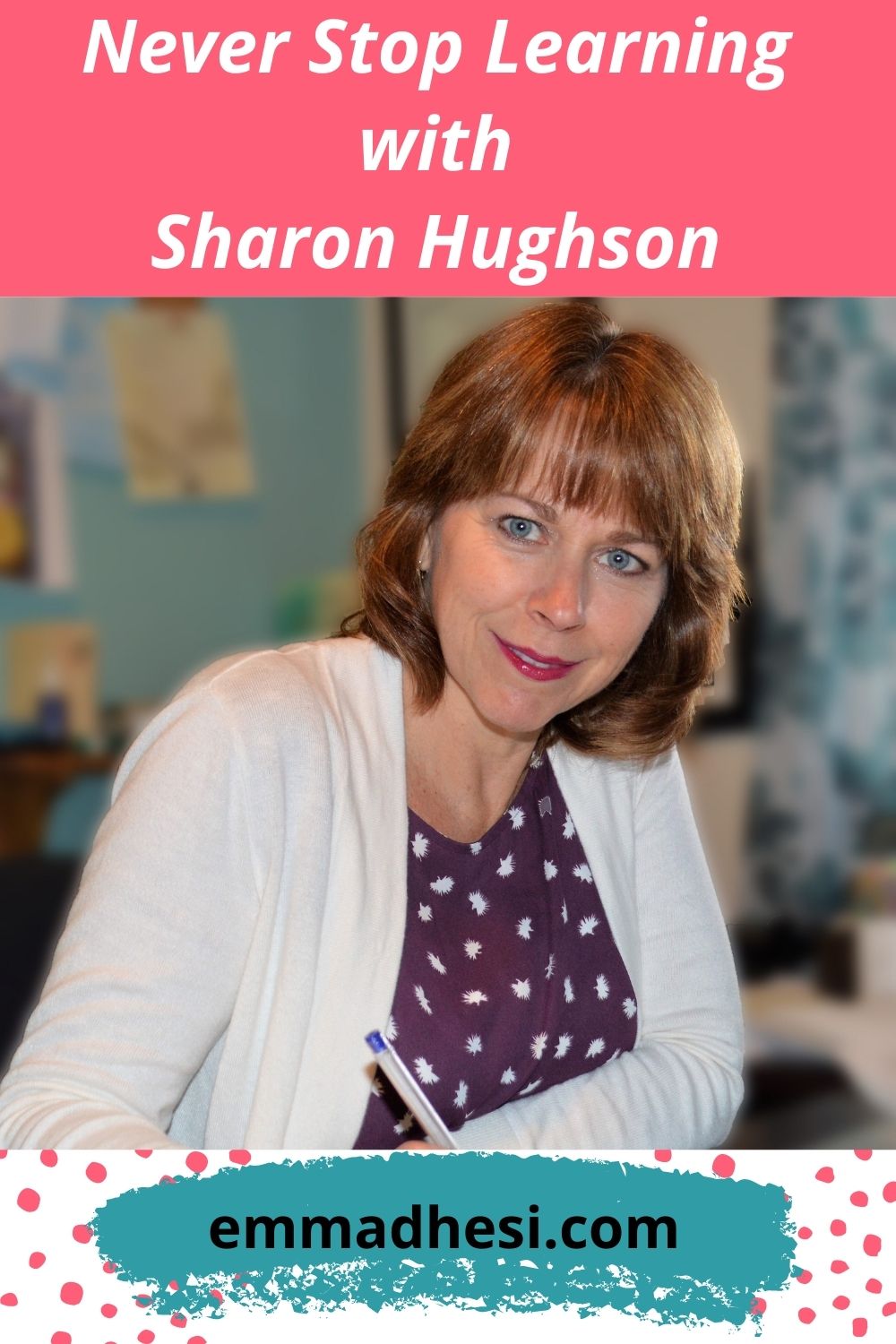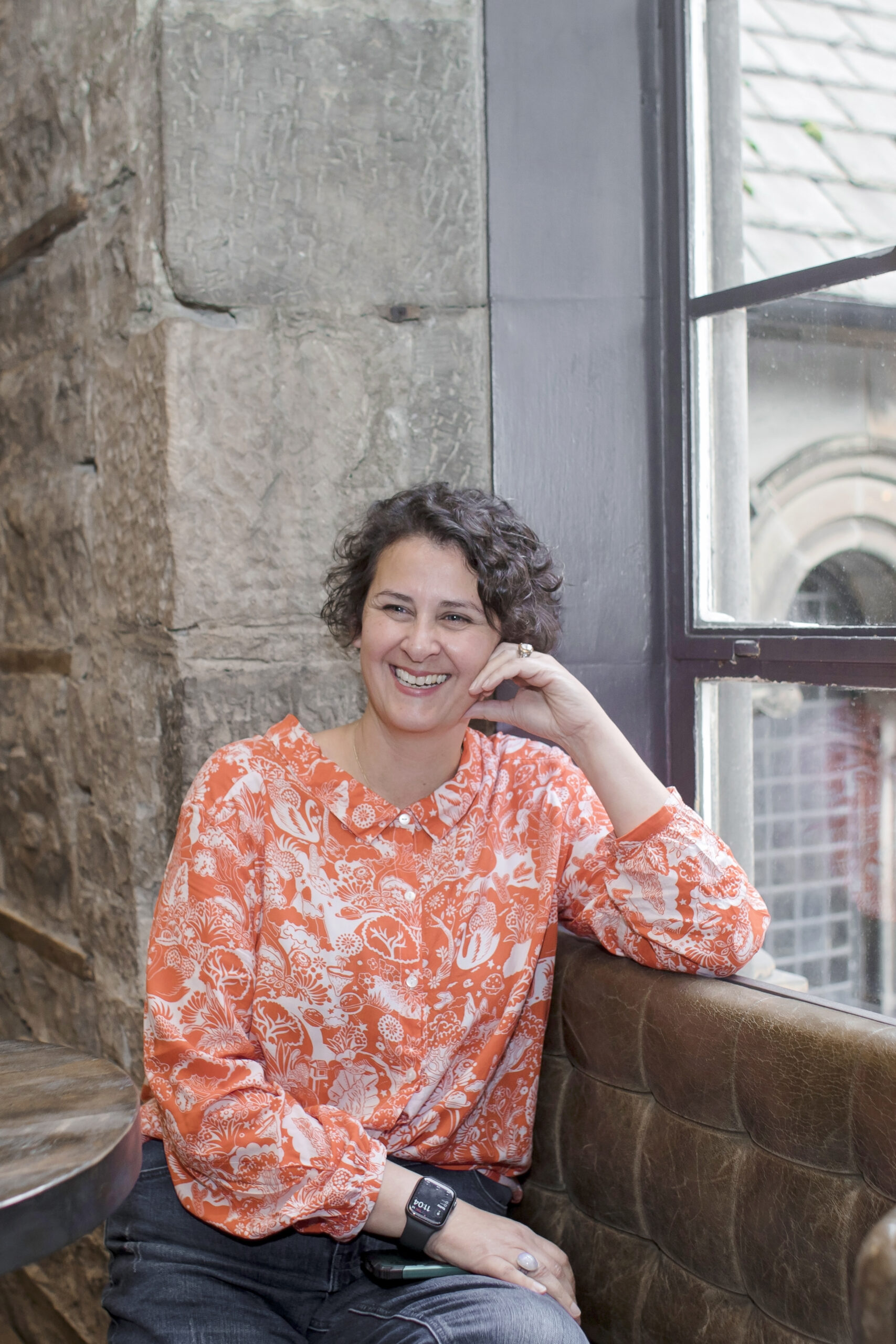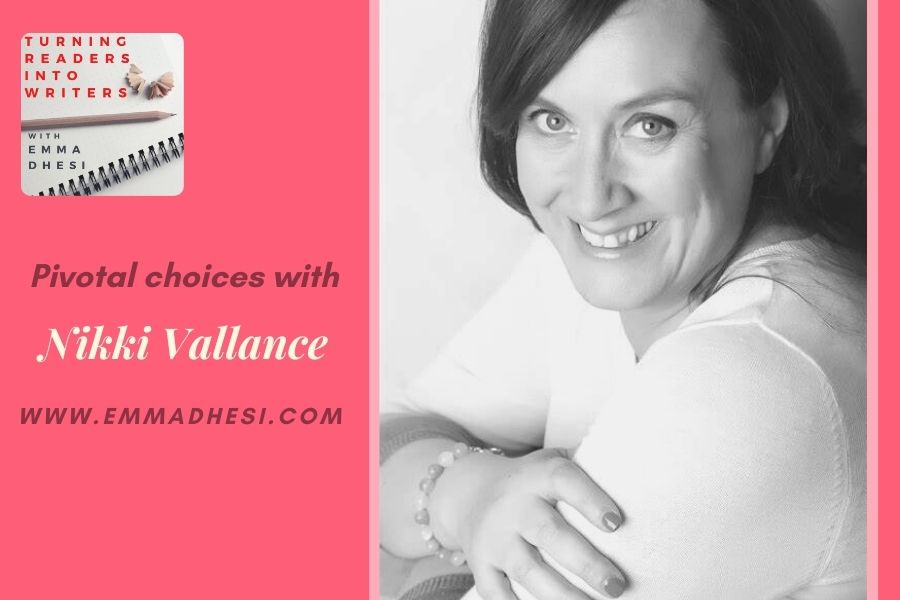
Pivotal choices with writing coach Nikki Vallance
Pivotal choices with writing coach Nikki Vallance
https://www.buzzsprout.com/971221/9698909Pivotal choices with writing coach Nikki Vallance
Emma Dhesi:
Nikki, thank you so, so much for joining me today. It’s lovely to have you on the show.
Nikki Vallance:
Thank you. It’s lovely to be here.
Emma Dhesi:
And now always start off the show by asking my guests tell us about your journey to writing. How did you get to where you are today?
Nikki Vallance:
Yeah. I’ll give you the potted short history because it’s, as you can imagine, with most of your guesses, it’s a little bit torturous. But basically, I’ve always been a writer. And I, I didn’t actually realize how early I’d started writing until my dad showed me something, he kept sorting out some stuff. And there’s a little story I’d written with some pictures, it was about kangaroo. I don’t even remember writing it. You know, I think it was probably about six at the time. And I wrote loads and loads of poetry. When I was in junior school, I wrote a teenage diary, which lots of people do may or may not be something that people would share. But it was a habit that I was writing every day. And then it all sort of got put to one side. And you know, life took over and work and everything else. And I guess I’ve always been writing because I used to write sort of marketing material. And I was in recruitment for a long time. So I was writing CVS in Habibi write CVS. But I basically had a coach at one point. And it I was pursuing three goals. One of which I said to her, if I don’t want to be structured, my whole life is structured, I’m in sales. I’ve got a sensible health goal, a sensible business goal, that actually is what’s something really exciting and new and fresh. And so I settled on having a creative goal. But I said, well, let’s just leave it free and see what happens. And so within a week, I came back to it, and actually, I think I’ve decided what it is I want to write a book. And within a second week, I said, No, I know what the books gonna be about. It’s going to be a novel, I’m going to publish it. And so it went from being unstructured to being completely structured. And then, and that was sort of, it took me from that point nine years to write my first book. And I’ll chat about that a little bit more. But once I decided I was going to write a novel, effectively, I was sort of prepared to sort of commit to it and admit that I was doing it. But really, it was all quite sort of secretive, really. And then there was a bit of a shift later on, when I went, No, this is gonna finish it. And then I finished it. And then and then we go from there.
Emma Dhesi:
That’s so interesting that you even though you’d made the commitment to yourself, and you’ve made that decision, which I think is kind of that’s you halfway there, once you make that decision, you’re a big portion of the way there. But what do you think it was that made you be sort of reluctant to share that with other people and sort of say, I’m going to do this,
Nikki Vallance:
it’s really interesting, because I think it’s something that a lot of people suffer with, when they first start, if you haven’t gone and studied something formally, but you know, deep down, it’s something you are really passionate about. Sometimes it’s very hard to sort of believe that you can do it unless somebody else validates it. And so lots of my clients now we’ll talk about this later, perhaps lots of my clients now say to me, but I don’t want to share my work. Because what if somebody doesn’t like it? And, and I’ve now realized, obviously, because I’m many years in that the best bit about sharing work is the feedback you get from people. And I say to look, please tell me exactly what you think. Because actually, that’s what helps me get better at what I do. And so I’m quite, I guess, thick skinned now and I say to people, look, not everyone is gonna like every book that’s that’s it’s subjective. The whole thing about art and and writing novels is that they’re not going to appeal to everybody. And so, but actually, if you can be constructive about what you’re saying to people, then that will help them to sort of understand is it something fundamentally that’s causing issue for everybody? Or is it just a dislike because somebody who doesn’t like that particular way of writing or that particular genre, so I’ve gone from being someone who was very reluctant to share, to being someone who’s happy, really happy to do it. And I think it’s actually that turning point is when you realize, if you don’t share, you’ll never, ever get your book in front of people. No one’s ever going to see it. So you have to kind of get over yourself and say, Okay, I’m gonna share my work.
Emma Dhesi:
Take that risk, kind of risking that it will be successful. Yeah. So talking of which your debut novel pivotal was published in 2019. Yeah, I’d love for you to tell us a little bit about it. And the inspiration behind it because it’s a fantastic premise.
Nikki Vallance:
Yeah. So um, it is a story that starts out With four seemingly unconnected lives of four women in their 40s. And they’re basically all thrown by a mysterious request that comes from nowhere. And so it actually does really disrupt their lives to the point where they can’t really cope with making the decision because they’re put under some time pressure. And there are also some strings attached, shall we say, so that it’s not just as simple as saying who you are, here’s some money. So they go to a hypnotherapist to make that decision. And actually, throughout the story, you’re wondering, are they connected? If they’re connected? How are they connected? But also, what are they going to do? And they’re going to say yes, or they’re going to say no, and that’s what pulls you through the story. But actually, the the premise behind it is, is all about what makes us who we are. And each of those individuals has had things happen to them in their lives that have been turning points have been pivotal. And how does that shape us? And it’s those questions about, you know, what, if they’ve done this, or what if they’ve done that? Where would they be now? How would they be responding to this dilemma that they’ve been facing? Yeah. And so that was the premise where it came from Good. Goodness knows, I literally, as I said, earlier, when I had that goal, I thought for quite fancy writing a book, and then I was going to sleep. And often that’s the time when your brain is quite creative, because it’s apparently because I’ve done like colored research with the circus, there’s a stage between what awake and sleep where your brain is in what they call FISA waves, which are below the surface of conscious thinking. And often, that’s where your inspiration can come from. And so I literally had this idea of, okay, if if this event occurred, how would that how would those parts of those those people be affected? And, yeah, so that’s where it came from. So the whole story arc, and those four characters literally landed in my brain, in, you know, in a second, as I was going to say, look, okay, that’s it, then I’ve got the idea. Of course, then you have to build the whole story around that. And that, that takes time. But yeah, but the initial premise came very quickly.
Emma Dhesi:
I can really relate to that, because I’m of a certain age now. And I’ve certainly kind of got to that halfway point, and been looking back on my own life and looking at the decisions that I’ve made, and some I have regretted some I’ve not, would I make the same again, it’s such a interesting period of life, I mean, know, to be able to look back with a bit of distance as well. Think about my kind of youngest now. So I’m sure a lot of your readers must be able to kind of relate to that.
Nikki Vallance:
I think, um, I do think that that is something it’s to do with a certain point when you do start looking back at but also, I think that lots of people are sort of channeled through this sort of standard way points in their life. So they think they have to do things in a certain order. And I’ve never been someone who’s felt that way. And so for example, with careers, I’ve changed direction, four times. And I do it at every point, it’s when I get to a bit more, I think, well, this isn’t actually satisfying me something’s missing or something, I want to explore something else. And I’ve always been interested in lots of things. And we spend so much time working that you have an absolutely passionate about this, you have to be spending time doing something that you love. Writing is an interesting thing, because you don’t actually have to give up a job to be a writer. In fact, probably I wouldn’t recommend that you do. Because it’s not that easy to make money from I mean, obviously, some people are very successful and do but the majority of writers, even some of the best sellers have another job as well. And so actually, the great thing about that is you don’t have to decide between two things. You could do both. But yeah, so I think it is those those sort of waypoints where you think, Okay, what am I going to do now, I’ve always believed from from quite a young age that actually you have to make sure that you are happy to doing what you’re doing. And if you’re not ready to go, you can take control of that, and you can change that direction. But you’re right about the midway point. And I guess I didn’t necessarily deliberately intend to write pivotal for people who are midway, but now I’ve been, I’m starting my second novel, and actually, that is the people I’m writing for. And it’s, it’s basically the kind of book I would want to read. And that’s why that’s why I wrote what I wrote. But there’s also definitely not enough books, written with characters, strong character, strong female characters who are at that stage of life. And I’m kind of trying to redress the balance a little bit and put more of that work out there. Because I’m sure there are lots of People who would like to see themselves reflected in the books they read, and there aren’t enough of them. So yeah, yeah. So that’s what
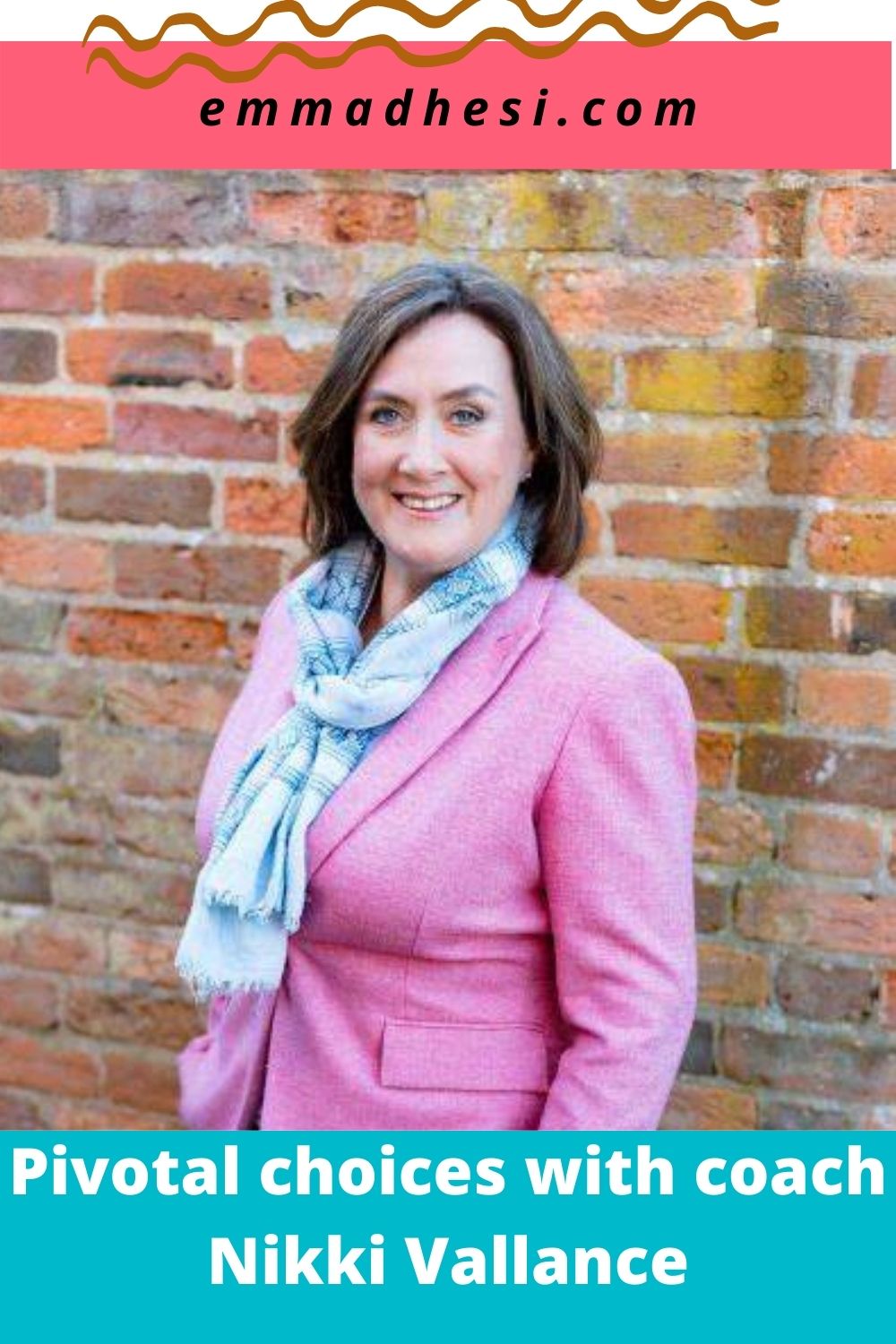
Emma Dhesi:
I yeah, I’ve read it. And I really enjoyed it. And I love being able to see elements of myself in all of the characters. So I really enjoyed that. Good. But So as you’ve mentioned, you know, you’re you don’t only write you also help other writers as well. And you, and one of the ways you do that is with your Facebook group. Yeah. And the Forgotten Books of lockdown, which I think is a lovely title. And I love what you’re doing here, because you’re matching authors with readers who may not have found each other because of lockdown. A lot of things were cancelled, weren’t they? Yeah. And is that what inspired putting the series on? And can you tell us a bit more about the series?
Nikki Vallance:
Yeah, so Okay, so the groups called the last books, lockdown. It’s a private group, but anyone can join, there’s just a few questions you need to answer to sort of show why why you think it would be suitable for you. And it’s absolutely for that reason to, there are lots and lots of events that didn’t happen, lots of festivals that didn’t happen. And also lots of people published books that don’t have massive marketing budgets, or displays in more stones. And those books are just as good sometimes, if not better than the books that you would obviously find through all that promotional activity. And so I just felt, okay, I can’t be the only one who feels they had a book out that hasn’t really reached enough people yet. What if I just said screw up and see what happens. And quite quickly, it kind of took off. And, and it is a mixture of people who are just pure readers who love finding new authors, people who are who are authors, often also readers, because that’s quite common. And also a few people who offer services to, you know, to the authors, to help them with their marketing, or social media or editing, or whatever it is, I’m trying to bring in those experts as well to help solve some of the problems that the writers have. And also some people who are readers, but I would call an expert readers. So for example, I interviewed Ann Williams, who’s a blogger, she’s got over 10,000 followers. And she is an avid reader. And she reviews for people and she is part of blog tours. And so she is someone who has, you know, she’s She doesn’t do it for money. She does it for the love of books, but she’s someone who the readers might be inspired by the watching. I might fancy doing that. So it’s really meant to be because there’s lots of groups writers, there’s lots of groups readers is really meant to be both
Emma Dhesi:
for both. Yeah, no, I caught that one with Ann Williams. And it was really good, because it just taught me a bit a little bit more about the blogging world, and from a writer’s perspective, more than a reader’s Yes. How influential it is, is quite amazing.
Nikki Vallance:
Yes, absolutely. And I think, you know, what I like about the group is, it’s sort of, it’s not for me, it’s for everybody. And everyone seems to be respecting what the group is for. And it seems to be attracting those kind of people who actually really respect the the effort that somebody like am puts into her passion. She doesn’t get paid for. And I mean, there are lots of people who can be a little bit snarky in the world, particularly in social media. And it seems to be that most people who are there aren’t that they’re actually really genuinely wanting to connect with people and and help each other. So that’s really great. So I do to say at the moment, there’s very few features is quite new. Still, there are two features. One is a weekly interview with an author. And the other one is a monthly interview with an expert. And there are more features coming in the new year.
Emma Dhesi:
Are you able to share at give us a teaser? Or you want to
Nikki Vallance:
know No, hopefully, hopefully, what’s happening is I’ve just literally in the group put a questionnaire together for people to answer so they can actually stay what which features they get when, and also the ideas I’ve had, they may not be the only ideas, some people might have some brilliant ideas of things that we could be doing. So I’ve asked people to make suggestions or to agree with the ones that I’ve come up with to see which ones we do first. And I think probably the first one is going to be a directory so that people can actually search for what they’re looking for. So if they’re looking for help with their book, they can look for that with the business experts or if they’re looking for a particular genre because they’ve got I don’t know, a 12 year old niece and they’re looking for a book for girls about adventures or fantasy or whatever, then they can look for that. Or if they’re authors, they can even if the readers are prepared to share what they’re interested in, find the readers who are looking for their genre, so hopefully it helps people too, because sometimes a feed in a group does have become a little bit outdated quite quickly, it’s hard to follow. This is sort of one way of getting to the action as quickly as possible. So I’m thinking it’s, I’m hoping it’s coming very soon, but I’m not quite sure exactly when it be ready. So
Emma Dhesi:
that’s exciting. And what a great idea. Yeah, I love it. Yeah, um, so you have their Facebook group, but you also kind of on a more personal one to one basis, you have your coaching programs that you offer. And there are fabulously titles. So would you take us through each of those?
Nikki Vallance:
Well, I’d like people to go to the website to look at them. Because it was just a little bit of fun. But basically, there are three different coaching packages which you can take up if you’re wanting to work with me one to one. And I know that not everybody would want to do that. But if you decide to do that, basically, you’ve got people who have no idea what they want to, they just know they want to write a book. So there’s a packaging there for them, they’ve got no idea about anything, and they need lots of structure and support. And I would help coach them through that. And then you’ve got people who have actually had quite a clear, clear idea about what they want, but they really know they’re not very great at staying accountable. So they just want someone to keep them accountable. And there’s one for that. And then really, it’s just if you want to think about the the ideas that you have, and the the kind of mapping that out. So you’ve got quite a strong idea about everything, but you just don’t do it on your own, because it’s quite a lonely thing, then I can help you do that. And yeah, so everybody’s different. But to be honest, what happens is often people start on the program, and then we go wherever, wherever it takes them. So pretty much everybody who works with B, it’s kind of a bespoke kind of variance.
Emma Dhesi:
Yeah, another by one to one coaching is that you do get that tailored approach. So you might start off with the system at the start of the program, you need one level of support. And then by the end, you need a different type of support. And when it’s you’ve got that relationship with your coach, then we can work together and move together through that very fluid. Now, you mentioned at the top of the show there that you’ve also worked with coaches before? And what do you what’s been the benefit, and some of the coaches, you’ve worked with how they helped you?
Nikki Vallance:
And okay, so I would say I’ve probably three or four times I’ve had a coach sometimes, well, nearly always for different reasons. But I would say the most important thing that I have found having a coach does for me is it gets me where I want to go more efficiently more quickly. And the reason for that is that a coach will give you will have a clarity of distance, they can see stuff that you can’t see, you might be saying it, and they can read the energy in what you’re saying. And they can hear the words you’re saying and reflect the back to you. And then you get insight and you go, Okay, well, I understand now why I’m stuck. And it helps move you forward. So you can absolutely write a book on your own. I did, there’s absolutely no reason to go and seek support. However, if you know where you want to go, and you want to get there more quickly, more efficiently, then just having somebody alongside you to make that step change is I think the best thing, so whenever I’ve done it, as I said to Jim, for different reasons, my life has looked completely different at the end of a three month period than it did at the beginning. Yeah, and so many things that I was stopping myself from doing have been lifted, those barriers have been lifted, and I’ve moved forward and it kind of takes on a bit of a momentum. I think you have to be careful to you have to be appreciate that when you start it will be challenging. But it will take on a bit of a life of its own because all those things you’ve told us if you can’t do it will actually show you that you can Yeah.
Emma Dhesi:
Oh so beautifully said I couldn’t have put it better myself. Yeah. Exactly that that transformation that you didn’t even know it’s possible for you being and do you coach across all different disciplines. Do you fiction, nonfiction poetry, or do you have a preference?
Nikki Vallance:
I tend to I think I could I think it’s a bit like teaching if you have a skill to do something you can you can coach anybody but I prefer to coach people who are writing novels. Mainly because there’s quite a lot services out there. So really good coaches you focus on like for example, business books or nonfiction passion projects. And it is actually probably a more structured process because those books tend to be very similar to each other. You know, there’s an expectation of what will be in them in the structure they We’ll have, and I think we’ve we’ve novels, I think it’s harder for people to know what they should be doing. It’s hard for them to be confident in themselves. It’s harder to have the right mindset. I think if you’ve got a business, you’re writing a book for it, you’ve already got a business, you know that this is part of your business model. Whereas when it’s when it’s something you’re doing from your heart, and it’s nurturing your soul, I think it’s, it’s harder for people. So in a way, although I could help anybody, those are the people I really feel would benefit best from my from my support. Yes, absolutely.
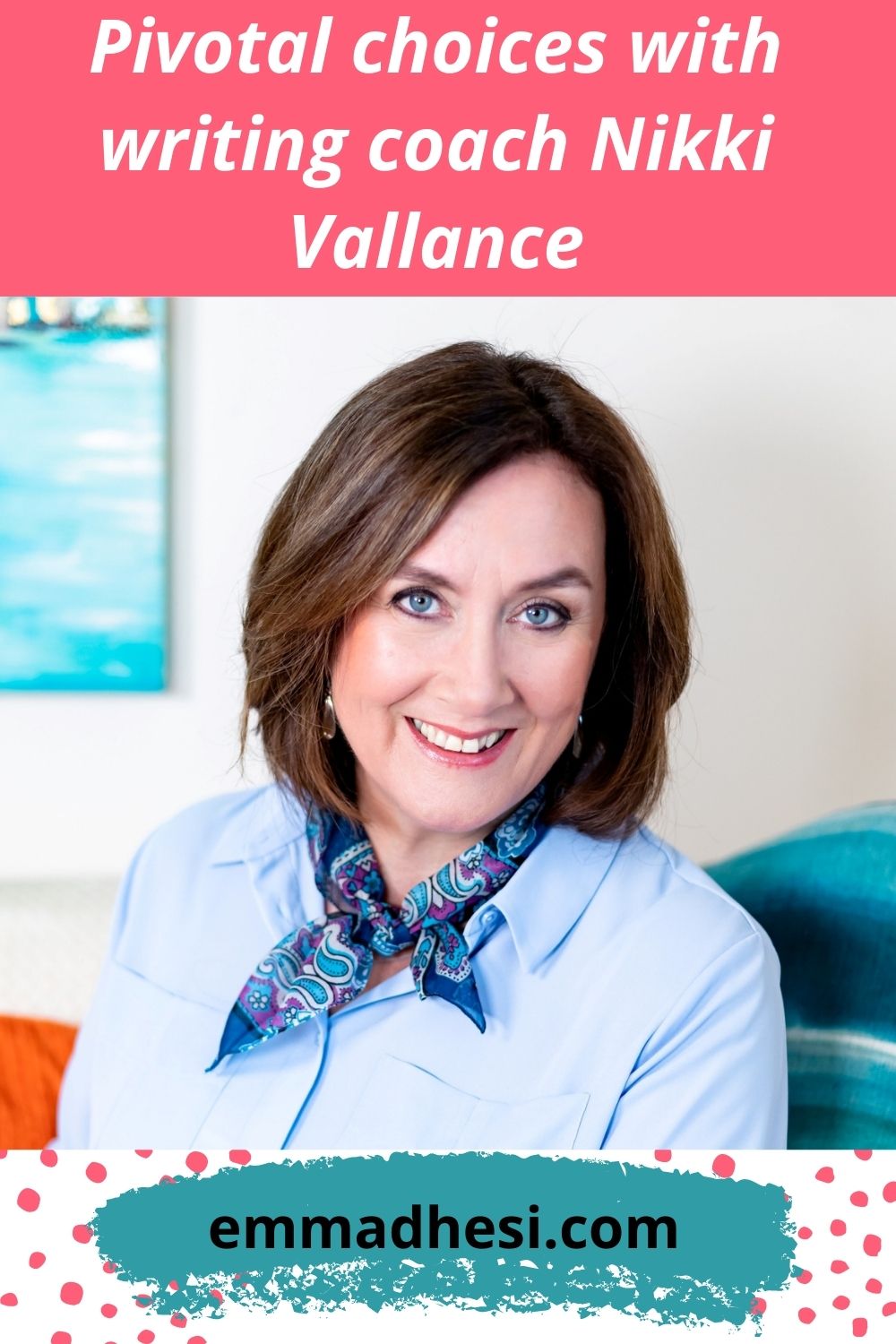
Interview with Nikki Vallance
Emma Dhesi:
Oh, my goodness. Now, as if that was not enough, as if you are not busy enough, I also host a writing community as well, called the writers poured. So how did how does that community work?
Nikki Vallance:
Okay, so it’s a very small group. And it refreshes every so often at the moment when we’re not running a program with it within the group. But basically, it’s, it’s what I would what I would describe as a writer’s group. And I set it up, because there’s lots of people who can’t go out well, at the moment, nobody can, but can’t go out regularly to a venue to meet up with fellow writers and the support that you get from being with a group of writers. So I thought, well, if it can’t go out, why don’t we have an online group and, and it’s an on top of that, because I’m a coach, why don’t I coach people, so when they don’t necessarily need or want one to one coaching, they can come to the writers pod. And they get a regular touch point, not particularly detailed coaching, because it’s very difficult to do that with a group. But certainly the structure and the accountability, and different challenges. And they can do different features where if they’ve got issues, they can actually discuss those issues with each other as much as with me. And that is the beauty of I mean, you’ll, you’ll know this, but if you’re in a group, with like minded people, who all have a similar goal, but they’re all individuals, and you feel supported and you feel it’s safe, then you can do that thing where you start sharing, because you may not have ever done that before. And this is a place where you can practice that sharing as work. And it doesn’t have to be part of your novel, it could be any piece of work that you’re working on. And often we would have like a writing theme. And I just get people to do a little flash fiction or something. And, and then it comes back. And then they get feedback, direct feedback straightaway. And, and so it helps to them to grow their confidence in themselves. And the main reason why I did it is because I felt that people more often than not, the thing that’s going to cause them an issue is their mindset isn’t really the ability to write or their creativity or anything else. It’s about their mindset and their self belief. And this this little group, which normally only has sort of an attend to 30 people in at any one time, really did give that to the people who were who are in it when it’s when it’s active, but at the moment is not active. And is one of the things that might get resurrected next year.
Emma Dhesi:
Well, it sounds fantastic. It sounds really perfect free, as you see for those people who are still nervous about sharing, don’t have that confidence, a really safe space for people to sort of spread their wings or put out some tentacles. Yes, you do. Yeah. One of the things that that was part of that, which I was really interested in was your the creators clinic. Yeah, where people could come and ask you questions. And so did you notice there? Were there any kind of themes around the questions? Was there questions that were more common than others? What did you notice? Yeah,
Nikki Vallance:
yeah. So very early on the things that people struggle with most when they say they’ve made the decision to write a book, but they haven’t got any knowledge about how to go about it. So the things that come up time and time again, are concerned about copyright. People worry that, for example, if they send their book off to an agent, what if someone’s going to steal it? And it’s quite a legitimate concern, because you’d have no idea how this thing works. But so yeah, that would come up. And the answer to that is, once it’s written, it’s if it’s in your name, then that’s it. It’s yours. policing, it is another thing. But um, but yeah, so and, and at the end of the day, you’re not going to write the same thing. Even if they stole the idea. It’s going to be written by somebody else. It’s not going to be the same book because that’s not written by you. So yeah, it’s one thing that early concern that ends up not being a problem. The most common the most common thing is, well, there’s two things one, where do I start? People have no idea where to start when they when they think about starting, they just haven’t got a clue. What should they do? Should they plot should they make characters should they? I don’t know. Think about which method they want to publish through. And so basically, there’s, there’s a few key things that they can do to get started. And the main thing is actually to get on with it, is to just start writing. And if that’s a struggle, putting in place some kind of process, so a particular time of day or a certain number of words, just something that structures it. So that isn’t an ad hoc thing. And those are the two things that I recommend to people straight away before they do anything else. And then the other thing, apart from the where do I start? Question is, how do I make myself believe this is possible? You know, how, where do I find the confidence to make this happen? Because I, once they’ve admitted they’ve been over a few weeks, I don’t think I can do this. Something in my head is telling me I can’t. And we just work on that mindset thing. We just work on that and say, Well, you know, actually perception is, I think it’s actually even in my book, I use this phrase perception is nine tenths reality. So if you believe something is possible, it will happen. And if you believe it can’t, it probably won’t. And what you have to do is get in the head of the person who has already written the book, project forward, and imagine it’s happened. And then think about how that affects the way you think and feel and write. And believe you are a writer, I don’t know what happened to me. But when I first had a form to fill in, I think it was about six months after I started writing had to fill in a form for medical appointment or something. And it said, you know, what is your profession, and the first time I put a writer down was like, Oh, I just, I’m a writer, and then put slash recruiter slash. Yeah, so get into that turning point is actually allowing yourself to claim it is is a big step. Yeah. And I think that’s something that people worry about, how can I say that I’m a writer, when I haven’t even got a book to show people what you start writing you are?
Emma Dhesi:
Yeah, it’s one of the things I sort of encourage my students to do as well. There’s just that mantra of I am a writer, I am a writer and just kind of keep seeing it, even if it’s just to yourself, but initially, it’s just a way of sort of building that, that belief in yourself. And until it feels less alien, yeah, and actually becomes a part of you. And when you believe that you’re a writer, you can step into being it and you step up for yourself and start prioritizing your writing and believing that you can do it.
Nikki Vallance:
I did. I did a little survey, it wasn’t a scientific one. I did a little survey in a big writers group on Facebook a few years ago. And once I’d kind of analyze the results. There were three answers that kept coming, because I asked them, what would the three most important attributes of a successful writer be? And three, the three that were most common, and it was surprising. The first one was you need to have creativity. Sorry, that was the third one rather, the third most popular, and I thought I would be the first I’m gonna thought most people would say you have to have, you have to have creativity, you have to have talent. But that came up was important, but not that important. The second most popular was you got to write you got to practice you just got to do it you got to be the more you do, the better you get. But then the most popular answer by twice as many as the others was persistence. It was actually about doing just keep on keeping on you need it for everything you need it when you start writing to keep yourself going. You need it when you ask for feedback you because you get knocked back there. You need it when you’re sending off work to agents, you need it when your book reaches the shops and maybe doesn’t sell as much as you’d like it to. Yeah, you need it when you get reviews and they’re not ones you want. So basically just got to keep going and and know where you want to go. I mean, I think that’s something that people find difficult. They just want they don’t want to write a book. They don’t know why. I think you can find out your real deep down why what are you actually trying to achieve? You know, then actually makes everything else all the decisions you have to make much much easier.
Emma Dhesi:
Yeah, so true. So true. It has become a bit of a cliche. Now this ask What’s your why, what. But the reason it’s a cliche is because it’s so important, and it’s so true. Yeah. And even if it’s just organizing your child’s birthday party, you kind of got to know that you’re going to do that if you want to achieve it. Yes. Big difficult project like writing a book if you know why you want to do it and what you’re trying to achieve and what success looks like for you get that project and make the in the steps in between so so much clearer and absolutely manageable.
Nikki Vallance:
I mean, you’ve probably done this as well if you ask yourself on anything. Why but you ask it five times, you know, like you kids do when they’re little but why but wow. During that, actually you get to the real why? Because I think sometimes people say I want to do it because I’ve always wanted to, well, that’s not really deep enough you need to go. But why have you always wanted to? And they just keep asking that question, you really get to the heart of what it is that makes you tick. And and I would always advocate have the biggest possible goal that you could ever imagine? Because it will take a long time. But there’s no reason why you can’t get there. But you have to be persistent.
From time to time, I link to products or services I love using with affiliate links. This means that I may receive a small percentage or fee for referring you to any product you may purchase from one of those sites. It does not cost you anything. These small fees help sustain my small business. I truly appreciate your support.
Interview with Nikki Vallance
Emma Dhesi:
Yes. Yes. Love it. Love it. So you are working on your second book, as you’ve mentioned, are you able to share anything about it?
Nikki Vallance:
I could share a little bit it is. So it’s a similar audience. It’s the characters are in midlife. And it is a dual timeline. story set in the late 80s. And early 2000s and 10s, attend 2010 2011. And it’s, it’s a very easy to determine the genre is a proper romance is a true, true story. Romance. of second chances. Oh, lovely.
Emma Dhesi:
I loved your timeline. So I’m excited about that.
Nikki Vallance:
And also, I think for our for our age group, but I mean, you’re not the same as me, necessarily. But I think we reach a point and we do look back. And actually we often look back to that really formative sort of teens young adult time. And for me, that was 80s. And so that nostalgia really plays into the book as well.
Emma Dhesi:
It frightens me, you know that. Our youth is now considered historical. Whatever makes me laugh. Oh, well. Lovely. It’s been so nice chatting with you, Nikki, thank you so much for joining me today. And just before we wrap up, I wonder could you let our listeners know where they can find out more about you your coaching and your fiction?
Nikki Vallance:
Yeah. Okay. So it’s very simple. My website is my name.com so it’s Nikki and I K Aki. valance, VA Double L ey nc.com. And I am on Twitter, Facebook and LinkedIn. Although not there very actively, and Instagram, all under my name. Some of them I’ve got underscores, but you should be able to find me quite easily and it’s all linked through my website as
Emma Dhesi:
well. Fantastic. Well, I’ll be sure to put a link to your website in the show notes so everyone can can find you easily. Nikki, thank you so so much.
Nikki Vallance:
Thank you very much for having me.
If you are trying to write your novel, but lack the confidence or self-belief to see it through to the end, then join me in Unlock Your Creative Block.
It's the only programme that gets to the heart of why you can't finish your book, even though it's what you want to do more than anything else in the world.
Shortcuts for Writers


Emma Dhesi
Emma writes women’s fiction. She began writing seriously while a stay at home mum with 3 pre-school children.
By changing her mindset, being consistent and developing confidence, Emma has gone from having a collection of handwritten notes to a fully written, edited and published novel.
Having experienced first-hand how writing changes lives, Emma now helps beginner writers find the time and confidence to write their first novel.


